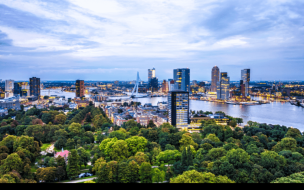As an MBA student, you get the chance to explore a variety of career options while at business school. You can take up different internships and build your network in line with your professional goals.
But more than that, an MBA is about exploring yourself. Often, it’s the chance to pause for reflection and assess your own personality—strengths, weaknesses, and ambitions—that can really help build your leadership capability.
Here’s five ways an MBA will make you a better leader:
1. Introspection
Before you lead others, it’s crucial to know yourself. Through self-reflection, you can better understand both your strengths and the areas you need to work on to improve your leadership abilities.
On the full-time MBA at Rotterdam School of Management (RSM), a flagship Personal Leadership Development program (PLD) takes students through a series of workshops emphasizing introspection and three coaching trajectories—individual, team-based, and careers coaching—designed to help professionals harness their own leadership potential.
Ann van Dam, director of MBA programs at RSM and a former student who took part in the PLD, says the program is about giving students space during their busy MBA experience to better understand themselves and where they’re going in their careers. “You come in a different person to what you come out as,” she says.”
Read: Dutch MBA Program Places Happiness At Its Core
2. Teamwork
Leadership is not about having all the answers, but enabling others to find solutions themselves. It’s about getting the best out of people, managing diverse groups, and being inclusive, whether that’s across different nationalities and cultures, genders, or the LGBTQ community.
An MBA degree throws students from different backgrounds together and forces them to work with one another. This experience helps candidates build those vital soft skills that employers are increasingly after—communication, emotional intelligence, and the ability to work in teams.
Michael John Magdongon is an MBA graduate from Rotterdam School of Management, Erasmus University now working at Amazon. “The further you move up the corporate ladder,” he says, “the more important soft skills become. Building relationships; speaking with clients; that all comes from the skills and lessons taught in the PLD.”
3. Social responsibility
Managing responsibly is not just about doing good; there’s evidence that it is profitable too. Post-financial crisis, leaders are expected to think about sustainability and social impact.
Fortunately, business schools in general have ramped up their focus on these topics on their MBA programs. Yet some locations are better suited to a focus on responsible management.
The Netherlands, for example, has a strong culture of social responsibility. There’s estimated to be between 4-to-5,000 social enterprises in the Netherlands today and RSM itself has been ranked among the world’s best business schools for sustainability
RSM has started presenting itself as the ‘MBA of Value’, reflecting a change in student motivations towards more purpose-driven careers and a curriculum with a focus on sustainability.
Read: MBA Students Move To The Netherlands For Social Entrepreneurship
4. Innovation
In today’s fast-paced environment, leaders need to know both how to manage rapid technological change and drive it.
Ji Zhang started his own educational technology—edtech—company before his MBA, which supports Chinese students looking to study abroad. One reason he chose RSM was for the Netherlands’ thriving startup ecosystem. Students at RSM can pursue entrepreneurship classes at the Erasmus Center for Entrepreneurship (ECE) at the Rotterdam Science Tower, which is home to over 100 startups.
Ji aims to work for a high-tech company in the Netherlands after his MBA, but he’s also thinking of further developing his startup. “I want to help Chinese students find their real career desires, instead of just following the road that society wants them to go down,” he explains.
The PLD at RSM, he says, has given him the opportunity to test out new ideas. “It provides the time for you to think of something you may never have thought of before.”
5. Hands-on experience
In today’s MBA classroom, learning theory is almost always accompanied by a heavy focus on practical, experiential learning.
Leadership is not always about doing. But, as well as understanding yourself, it helps to understand the experiences of others. Hands-on experience can help a leader appreciate the intricacies of what he or she is asking others to do.
During his MBA at Rotterdam School of Management, Michael visited a local nonprofit which sent out birthday and Christmas gift boxes to kids from low-income families. Working alongside the charity workers, he came to understand the importance of social responsibility and teamwork; he saw the benefits of innovation; he focused on what’s important for him; and he got that practical, hands-on experience too.
By giving you the environment, support, and skillset needed to develop yourself, an MBA will make you a better leader.










